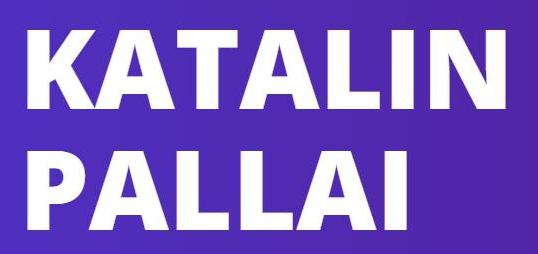Leading collaborative process of complex curriculum and faculty development, since 2014
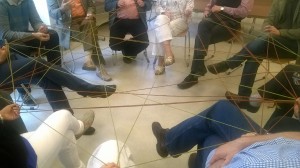 This project is connected to the one described below, the Postgraduate Program for Integrity Advisors. The public integrity advisors, whom we train, often work in corruption tolerant institutional cultures. For strengthening democratic public integrity of these public institutions the advisers need not only technical skills, but training in post-positivist argumentative methods and in facilitative and transformative leadership as well. At the same time, the program must employ practitioners who can transmit the new professional skills, and academics, who are accustomed to formal lecturing. Both of these groups trained only in positivist theories. At the start only a very few of the faculty apply experiential methods and was familiar with argumentative approaches. The aim of the series of faculty workshops I initiated was (1) to offer own experience for faculty of a transformative dialogue space, (2) to use the process for creating substantive synergy among the various subjects that are delivered by them, (3) to create shared norms and objectives not only for the delivery of content but also for the ethical stance faculty transmits to students, and (4) to build the methodological development of faculty on these own experiences. The process has not ended yet but it has already achieved a specific culture for faculty relations and for the education within the program, and has impact on both the coherence of content and the diversity of methods.
This project is connected to the one described below, the Postgraduate Program for Integrity Advisors. The public integrity advisors, whom we train, often work in corruption tolerant institutional cultures. For strengthening democratic public integrity of these public institutions the advisers need not only technical skills, but training in post-positivist argumentative methods and in facilitative and transformative leadership as well. At the same time, the program must employ practitioners who can transmit the new professional skills, and academics, who are accustomed to formal lecturing. Both of these groups trained only in positivist theories. At the start only a very few of the faculty apply experiential methods and was familiar with argumentative approaches. The aim of the series of faculty workshops I initiated was (1) to offer own experience for faculty of a transformative dialogue space, (2) to use the process for creating substantive synergy among the various subjects that are delivered by them, (3) to create shared norms and objectives not only for the delivery of content but also for the ethical stance faculty transmits to students, and (4) to build the methodological development of faculty on these own experiences. The process has not ended yet but it has already achieved a specific culture for faculty relations and for the education within the program, and has impact on both the coherence of content and the diversity of methods.
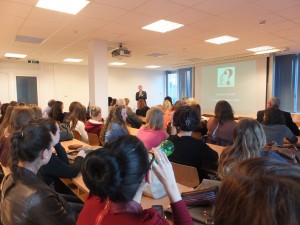 Program director and re-designer of the post-graduate education program for integrity advisors, 2014
Program director and re-designer of the post-graduate education program for integrity advisors, 2014
I was commissioned to redesign the formerly traditional academic education program for integrity advisors to a modern competency based program. The goal of the new approach is to develop both the professional competences in the specific roles the advisors need to play in public organizations, and to foster the ethos needed for fulfilling these roles in the public domain. Nine professional competency subjects are in the focus of the curriculum, that cover the roles assigned to integrity advisors. Academic knowledge is connected to these professional competencies and are taught to offer conceptual foundation and underpinning to difficult professional decisions. Personal competency development trainings complete these subjects. One methodological innovation is the wide use of experiential methods in order to develop reflective and argumentative skills of the students, the other is a deliberate norm socialization process during the training that is aimed to offer models for similar activities that the advisors have to perform in their organizations during their practice.
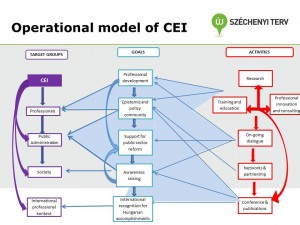 Building up the Center for Excellence in Integrity at the National University for Public Service, since 2013
Building up the Center for Excellence in Integrity at the National University for Public Service, since 2013
The Center for Excellence in Integrity (CEI) was established to secure sustainability for the results obtained during the implementation of the Corruption Prevention project mentioned below. The mission of CEI is to foster the implementation of public integrity in Hungary by gathering, generating and disseminating knowledge and innovative methods for corruption prevention and integrity management, and by taking an active part in advancing the case for public integrity. CEI’s activities include research, policy initiatives and knowledge sharing among professionals and to the wider public. CEI’s responsibility is also the development of integrity curriculum for the National University for Public Service and its quality assurance. My role has been to launch the operation of the Center, identify the role it should play, design a strategy for its sustainable functioning and lead its operation.
Intergity management education, Hungary, since 2012
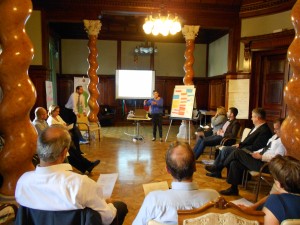 In the frame of a large EU financed project on Corruption Prevention, implemented in cooperation between the Hungarian National University of Public Service and the Ministry of Public Administration, I was commissioned to develop training curricula for integrity advisors and civil servants. On the basis of the curricula the largest further education program of the Hungarian public administration is being implemented: more than 800 senior civil servants and 8500 civil servants (10 % of the civil service) were educated on corruption prevention and on approaches to strengthen organizational integrity. I have also presented the training for a group of state secretaries, deputy state secretaries and government commissioners. The methodology I developed was peer reviewed by a high level international peer team and acknowledge as innovative even in the 2014 Anticorruption Report of the European Commission. On the basis of the method I also developed a course on integrity management for MA level university education. From 2014 the course will be part of the obligatory curriculum at the National University of Public Service and introduced on other Hungarian universities as well.
In the frame of a large EU financed project on Corruption Prevention, implemented in cooperation between the Hungarian National University of Public Service and the Ministry of Public Administration, I was commissioned to develop training curricula for integrity advisors and civil servants. On the basis of the curricula the largest further education program of the Hungarian public administration is being implemented: more than 800 senior civil servants and 8500 civil servants (10 % of the civil service) were educated on corruption prevention and on approaches to strengthen organizational integrity. I have also presented the training for a group of state secretaries, deputy state secretaries and government commissioners. The methodology I developed was peer reviewed by a high level international peer team and acknowledge as innovative even in the 2014 Anticorruption Report of the European Commission. On the basis of the method I also developed a course on integrity management for MA level university education. From 2014 the course will be part of the obligatory curriculum at the National University of Public Service and introduced on other Hungarian universities as well.
In 2014 in the frame of the life-long education program for civil servants I designed a one day long Public Ethics training methodology for staff members and a 2,5 days Integrity management curriculum for public sector leaders and trained the trainers for the trainings. Due to the good reputation of the previous integrity trainings presented during the earlier mentioned EU sponsored project, a large number enrolled already in the first months. According the forecast by the end of 2014 15% of the Hungarian civil service will be trained by my methodologies.
Associated Professor at the National Public Service University, Budapest, Hungary, since 2011
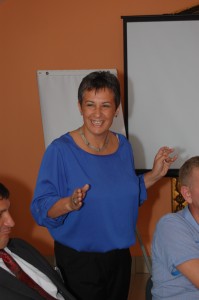 At the university I teach courses on English and Hungarian on communication, alternative dispute resolution, multiparty disputes and consensus building processes. My courses offer an introduction to negotiation, conflict analysis and resolution, and show how can be alternative dispute resolution methods applied in multi-stakeholder processes: how can representation be organized, and how can consensus building processes facilitated and led to sound and sustainable solutions. The courses present the theoretical underpinnings to both multi-stakeholder processes and conflict resolution, involve participants in various exercises and practical challenges, and initiate in depth discussion on professionally and politically correct process design and facilitation. The courses are presented for MA level in English and parts of it are also presented in Hungarian in the frame of post-graduate education and will be part of the new Doctoral School curriculum.
At the university I teach courses on English and Hungarian on communication, alternative dispute resolution, multiparty disputes and consensus building processes. My courses offer an introduction to negotiation, conflict analysis and resolution, and show how can be alternative dispute resolution methods applied in multi-stakeholder processes: how can representation be organized, and how can consensus building processes facilitated and led to sound and sustainable solutions. The courses present the theoretical underpinnings to both multi-stakeholder processes and conflict resolution, involve participants in various exercises and practical challenges, and initiate in depth discussion on professionally and politically correct process design and facilitation. The courses are presented for MA level in English and parts of it are also presented in Hungarian in the frame of post-graduate education and will be part of the new Doctoral School curriculum.
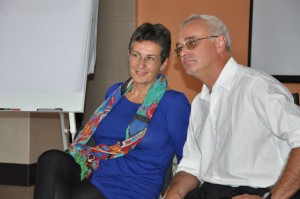 Leadership Academy of the Council of Europe, co-designer, mentor and trainer, since 2011
Leadership Academy of the Council of Europe, co-designer, mentor and trainer, since 2011
This is a multi-country program of the Council of Europe was launched in 2011, and has been introduced already in 8 countries. The program offers nine months long leadership education for local government leaders. The aim of the program is to offer a framework for the analysis of the actual municipal performance and initiate reflection on possible improvements; to encourage leaders’ reflection on their own leadership concepts and mindset; to develop their competencies, and the skills and tools they can apply; all in order to improve their capacity to release leadership capacities in others and to create an environment in which others want to work with them, share their purpose and follow their lead. The thematic components include: development of personal competencies (emotional intelligence, leadership approaches and styles), strategic approach and learning organization, organizational development, team work, innovation and change management, human resource development, performance management, partnership building, communication, participation, leadership benchmarking)
In the program my duties are (with a colleague from UK): to design of the teaching material; to train and mentor the teams of trainers for participating countries; to work as trainer in the first training cycles in each country and coach local trainers till they can gradually take over the work; to analyze implementation experiences and use them for further development of the program. In my native country, Hungary, I run the program, in cooperation with the Association of Municipalities, as lead expert and trainer.
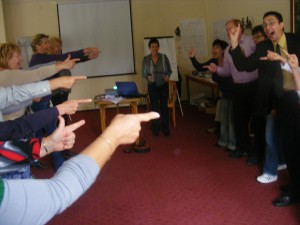 Training of local councillors, designer, trainer of trainers and trainer, 2010-11
Training of local councillors, designer, trainer of trainers and trainer, 2010-11
In the frame of a cooperation between the Hungarian and Norwegian Association of Local Governments I was responsible for the elaboration of an introductory training program for elected local councilors. In the frame of the program I developed a training methodology and package, and trained a first group of 40 trainers to deliver the trainings for the newly elected local assembly members after the local election in 2010. The aim was to train the assembly members of one local government together in order to work not only on the knowledge and competencies of individual counselors but to equally help them to develop some shared assumptions for their work and personal relations. Training components assist the participants to acquire the requisite knowledge, the appropriate attitude and the necessary cpmpetencies that are required to foster decentralization and make municipal administration and management a success. (The content elements of the trainings include: local democracy and sustainable local development, accountability, decision making, planning, participation and communication, financial management, organizational management, public service management). My role was to design the training program, train the first group of trainers, and after the local elections, train some of the newly elected councils.
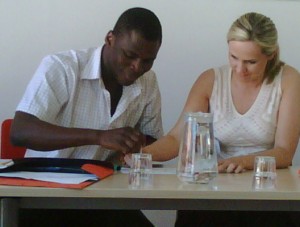 Multi-ethnic Community Management Program, 2005-10
Multi-ethnic Community Management Program, 2005-10
Between 2005 and 2011 I worked for 7 years as faculty in the frame of this program established by the Open Society Institute and had the opportunity to develop and teach courses with leading experts of minority rights and other fields of minority studies. The courses focused on local political opportunities (and limitations) in the accommodation of the needs and aspirations of ethno cultural minorities. The course development was an interdisciplinary work where my role was to bring in the knowledge of local governance, dispute resolution and field experience from local democracy building. During the course development I worked with the minority experts to develop an integrated conceptual framework and experience based teaching material to discuss existing local multicultural policies and practices and to identify the major issues and dilemmas in the local management of ethnocultural diversity. Each course was presented to a widely international audience, including participants from Europe, Africa, Asia. The courses I designed and led with a co-trainer were: Minority rights and local governance; Power sharing in Multi-ethnic Communities; Public Policy Process in Multi-ethnic Communities; Service delivery in Multi-ethnic Communities; Managing Conflict and Urban Development in Multi-ethnic Communities.
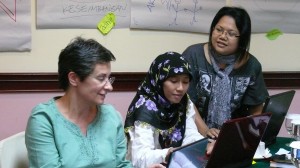 Local Development Planning in context of Extractive Industries, 2008-10
Local Development Planning in context of Extractive Industries, 2008-10
Revenue Watch Institute and the Local Government and Public Service Initiative of the Open Society Institute has launched a project that assisted local stakeholders in various countries to establish multi-stakeholder processes to strengthen transparency of extractive revenues of government and of planning processes; and establish local participatory planning processes that assist local governments in effective spending of extractive revenues. The main aim of the project was to assist local governments to avoid the resource curse by starting local awareness-raising and planning processes before extractive incomes are generated. The key components of the project were: to advocate for oil revenue transparency; providing technical assistance and capacity building to stakeholders and helping to establish participatory local planning and budgeting processes; working in local governments strengthening civil society and citizens to monitor government service delivery effectively; and strengthen civil society and citizens to monitor government service delivery effectively. Between 2008 and 2010 my duties in this program were: to elaborate a planning methodology that accommodates all specificities of the extractive industry context into the local development planning process; pilot it by offering technical assistance to multi-year participatory planning processes in Indonesia; advise the initiated processes in Peru; train and coach local teams to enable them to continue the initiated strategic development planning process and start similar processes in other localities.
Leadership Peer Review of Local Governments, 2007-10
The Leadership Peer Review methodology was elaborated by the Center of Expertise of the Council of Europe and adapted in 2008 to the Hungarian environment by a Hungarian Team of experts. In the frame of the program first a set of benchmarks are elaborated that serve as a reference system for the peer review. Then peer teams are organized of experienced local government decision makers and experts from other localities (the peers). The peer teams conduct a systematic analysis of the local government leadership and management in the locality. The peer review process provides the evidence from both documents and stakeholders on the basis of which an assessment can be made. The focus of the assessment is on the corporate leadership and management of the local authority rather than the detailed operations of individual services. On the basis of the assessment the peer team supports the local government to draw up and implement an Improvement Plan. After years of working on the international program of the Council of Europe as trainer and international expert, I led the adaptation work, the training of peers and the work of the first peer reviews in Hungary, and presented and wrote the assessment reports, and assisted the elaboration of Improvement Plans.
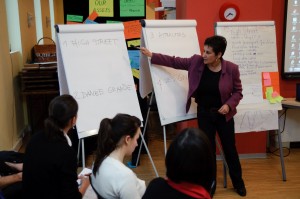 Management of Urban Change in Transition cities – summer university course organized by the Summer University Program of the Central European University, 2001-2009
Management of Urban Change in Transition cities – summer university course organized by the Summer University Program of the Central European University, 2001-2009
For six years, between 2004 and 2009, I was the course director and designer of two weeks long courses that were organized for an international audience of academics and decision makers, and university faculty who planned to teach similar subjects. In order to exploit the diversity of backgrounds and experiences of participants the course was led in a highly interactive manner creating a balance among components that are knowledge pieces, field visits, practical exercises and discussions. The content was structured by a clear conceptual framework that supported the assessment of strategies and used exercises and cases studies from World regions to illustrate the concepts presented. The main areas covered during the course were Sustainable communities, Strategic development planning, Urban planning, Participatory processes, Area based development, Territorial and community conflicts and their management, Real estate markets, Horizontal and vertical coordination in development planning.
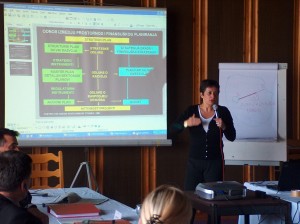 Course director and adapter for CEE of the World Bank Institute Urban and City Management course, 1999-2001
Course director and adapter for CEE of the World Bank Institute Urban and City Management course, 1999-2001
After many years of serving as faculty member of the World Bank Institute Core Course on Intergovernmental Finance and Local financial management, I was commissioned in 1999 to adapt the Urban Management Core Course of WBI for the CEE region. The Urban Management course was a two weeks long executive training program that aimed to assist decision-makers and practitioners in designing and implementing better urban policies through: (1) deepening the understanding of the complexity of urban issues confronting the region, and (2) exposing the participants to new strategies, tools and practices to effectively address these issues. My job aws to adapt the WBI core course for the needs of post-communist transition cities and, in the follwoing years, direct the courses organized in the region.
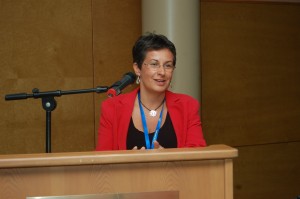 Counselor to the Mayor of Budapest, 1991-2001
Counselor to the Mayor of Budapest, 1991-2001
Between 1991 and 2001, as a freelance expert, I have been working directly for the Mayor of Budapest and for his expert team. I was a participant in the drafting and implementation of the urban policy reforms in Budapest. Several times I led expert teams drafting various comprehensive urban policy documents for Budapest. I was chief planner and project director of the elaboration of the major urban policy concepts during the 1990s (1991, 1994, 1998) and was also active in the Project Coordination Board of the City between 1994 and 1998. My other task was to advise the Mayor’s Office on inputs to legislative drafts, issues related to regional development and advise the representation of the Municipality on different regional and developmental boards. I was author of various publications of the Mayor’s office that presented the policy concepts and results planned and achieved. In 2003-4 I edited and partly wrote a book on the history and analysis of the twelve years of the municipal reform process in Budapest.
